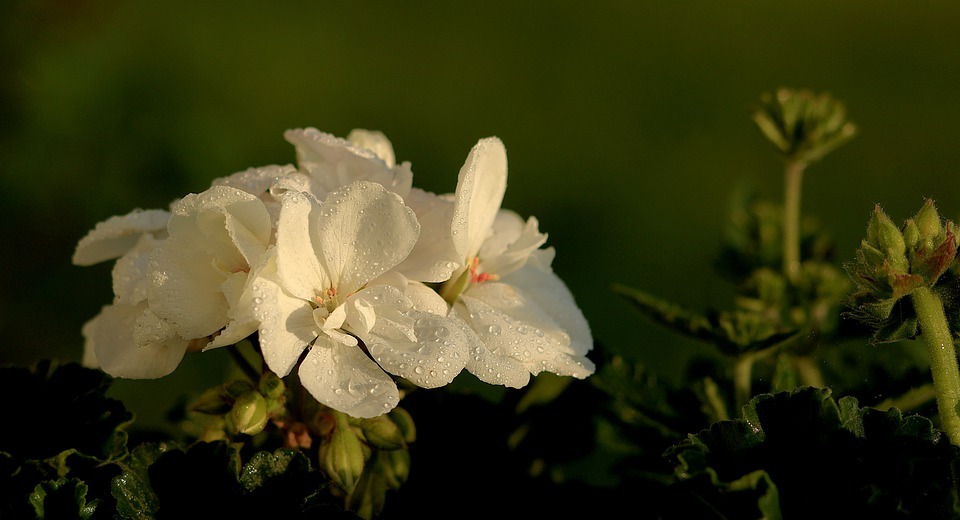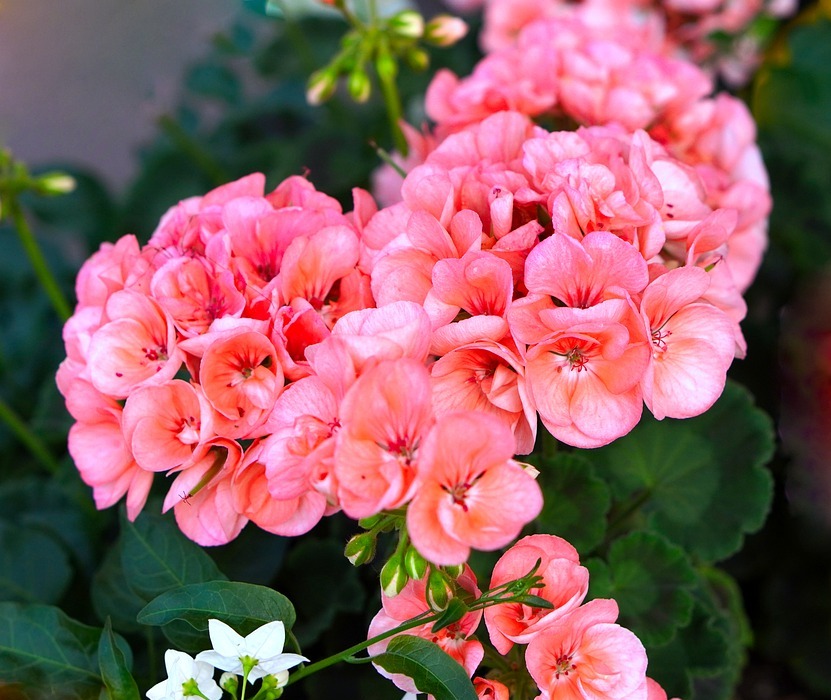This comprehensive guide will explore the potential hazards of geraniums to rabbits, providing you with the knowledge necessary to ensure the safety of your furry companion. We will delve into the toxic compounds present in geraniums, the various symptoms of poisoning, and the specific geranium varieties that pose the most significant risk. We will also discuss safe alternatives to geraniums and provide essential preventive measures and first-aid advice.
Part 1: Understanding the Toxicity of Geraniums

1.1. Geraniums: A Popular Choice, But Not for Rabbits
Geraniums, belonging to the Pelargonium genus, are beloved for their vibrant flowers and pleasant fragrance. They grace gardens, balconies, and homes worldwide, adding a splash of colour and vibrancy to our surroundings. However, for rabbits, these seemingly harmless plants can pose a serious threat.
1.2. The Culprit: Geraniol, a Fragrant Threat
The toxic component responsible for the potential harm to rabbits is geraniol, a fragrant oil found in all parts of the geranium plant, including the leaves, stems, and flowers. This compound, while responsible for the delightful aroma, can have detrimental effects on rabbits' delicate systems.
1.3. The Impact of Geraniol on Rabbits
Geraniol's toxicity varies depending on the geranium variety and the amount consumed. However, even small quantities can cause adverse reactions in rabbits, ranging from mild digestive upset to potentially life-threatening complications.
1.4. A Closer Look at Geraniol's Effects
- Gastrointestinal Distress: Rabbits may experience vomiting, diarrhoea, and severe abdominal pain.
- Neurological Issues: Geraniol can affect the nervous system, leading to lethargy, weakness, tremors, and even seizures.
- Respiratory Complications: Breathing difficulties, coughing, and wheezing may occur due to irritation of the respiratory system.
- Skin Irritations: Direct contact with geranium leaves can cause dermatitis, itching, and redness on the skin.
- Excessive Salivation: Rabbits may experience excessive drooling as a reaction to the plant's toxins.
- Loss of Appetite: Geraniol's effects on the digestive system can lead to a loss of appetite, contributing to malnutrition.
- Dehydration: Vomiting, diarrhoea, and decreased appetite can result in dehydration, further compromising the rabbit's health.
1.5. Severity and Individual Factors
The severity of symptoms depends on several factors, including the quantity of geranium consumed, the rabbit's size, overall health, and individual sensitivity to the toxins.
Part 2: Identifying Harmful Geranium Varieties

2.1. Not All Geraniums Are Created Equal
While all geraniums contain geraniol, the concentration and toxicity levels vary between different species. It's crucial to be aware of the specific varieties known to be particularly hazardous to rabbits.
2.2. Common Geraniums: A Moderate Threat
The most widespread type of geranium, often found in gardens and homes, is the common geranium (Pelargonium x hortorum). It is considered moderately toxic to rabbits, meaning that ingestion can lead to various symptoms, but it's not the most dangerous variety.
2.3. Scented Geraniums: A Higher Risk
Scented geraniums, including the popular rose geranium (Pelargonium graveolens), are prized for their strong, fragrant oils. These varieties contain a higher concentration of geraniol, making them a greater threat to rabbits.
2.4. Ivy Geraniums: A Mild Threat
Ivy geraniums (Pelargonium peltatum), with their trailing vines and delicate flowers, are often used in hanging baskets. These are generally considered mildly toxic to rabbits, but it's still important to prevent them from being ingested.
Part 3: Safe Alternatives to Geraniums
3.1. Replacing Geraniums with Rabbit-Safe Plants
If you're seeking a beautiful and safe alternative to geraniums, a variety of rabbit-friendly plants can brighten your home without posing any threat to your furry companion.
3.2. Catnip: A Safe and Stimulating Option
Catnip (Nepeta cataria) is a popular choice for rabbit-safe plants. It's not only safe but also provides a stimulating effect for many rabbits, often inducing playful behaviour.
3.3. Basil: A Nutritious and Delicious Treat
Basil (Ocimum basilicum) is another excellent choice for rabbits. This aromatic herb is not only safe but also provides essential nutrients and a delightful flavour.
3.4. Rosemary: A Calming and Aromatic Plant
Rosemary (Salvia rosmarinus) is a safe and fragrant option for rabbits. It's known for its calming properties and can add a pleasant aroma to your home.
3.5. Mint: A Treat in Moderation
Mint varieties, including peppermint and spearmint, are generally safe for rabbits in small quantities. However, some rabbits may experience digestive upset, so moderation is key.
3.6. Clover and Dandelion: Nutritious Lawn Delights
Clover (Trifolium spp.) and dandelions (Taraxacum officinale) are safe and nutritious treats for rabbits. These common lawn plants are often a favorite snack for rabbits in their natural habitat.
Part 4: Preventing Geranium Poisoning in Rabbits
4.1. Prevention: The Best Form of Protection
The best way to protect your rabbit from geranium poisoning is to prevent them from ever ingesting it. With careful planning and vigilance, you can create a safe environment for your furry friend.
4.2. Keeping Geraniums Out of Reach
Place geraniums in rooms that your rabbit does not have access to, or keep them in areas where your rabbit cannot reach them. This could include hanging baskets high off the ground or placing them on shelves that are inaccessible.
4.3. Supervise Closely When Near Geraniums
If you have geraniums in your home, always supervise your rabbit closely when it's in the same room or area. Keep a watchful eye and intervene immediately if you see your rabbit showing interest in the plant.
4.4. Educating Family Members
Make sure everyone in the household understands the dangers of geraniums to rabbits. Children, especially, need to be informed about the importance of not allowing the rabbit near these plants.
Part 5: First Aid for Geranium Poisoning
5.1. Acting Quickly is Crucial
If you suspect your rabbit has ingested geranium, prompt action is essential. Time is of the essence when dealing with potential poisoning.
5.2. Contact Your Veterinarian Immediately
Without delay, contact your veterinarian for advice and instructions. They will be able to assess the situation and guide you on the best course of action.
5.3. Remove the Rabbit from the Area
Immediately remove your rabbit from the vicinity of the geranium plant to prevent further ingestion.
5.4. Observe for Symptoms
Closely observe your rabbit for signs of poisoning, such as vomiting, diarrhoea, lethargy, tremors, or breathing difficulties. Keep track of any changes in behaviour or physical condition.
5.5. Bring a Plant Sample to the Vet
If possible, bring a sample of the suspected geranium plant to the veterinarian. This will help them identify the specific type of geranium and confirm the diagnosis of poisoning.
Part 6: FAQs
6.1. Can rabbits eat geranium leaves?
No, rabbits should not eat geranium leaves. They contain geraniol, a toxic compound that can cause serious health problems.
6.2. Are all geraniums toxic to rabbits?
While all geraniums contain geraniol, some varieties, like scented geraniums and ivy geraniums, are more toxic than others.
6.3. What are the symptoms of geranium poisoning in rabbits?
Symptoms of geranium poisoning can include gastrointestinal upset, neurological issues, respiratory distress, skin irritation, excessive salivation, loss of appetite, and dehydration.
6.4. What should I do if my rabbit eats a geranium?
If you suspect your rabbit has ingested geranium, contact your veterinarian immediately. Remove the rabbit from the vicinity of the plant and observe it for symptoms.
6.5. Is there a safe way to keep geraniums and rabbits together?
It's best to err on the side of caution and avoid all types of geraniums if you have rabbits. If you must keep geraniums, place them in areas inaccessible to your rabbit.
6.6. What are some rabbit-safe plant alternatives to geraniums?
Safe alternatives include catnip, basil, rosemary, mint (in small quantities), clover, and dandelion.
6.7. Is it safe to put geraniums in a rabbit's enclosure?
No, it is not safe to put geraniums in a rabbit's enclosure. Rabbits are naturally curious and may nibble on anything within reach.
6.8. How can I prevent my rabbit from eating geraniums?
Keep geraniums out of reach, place them in rooms your rabbit doesn't access, supervise your rabbit closely, and educate family members about the dangers.
6.9. What should I do if my rabbit has been vomiting after eating geranium?
Contact your veterinarian immediately. They will be able to advise on the best course of action and provide appropriate treatment.
By following the guidelines and advice outlined in this article, you can create a safe and enjoyable environment for your rabbit while also enjoying the beauty of your garden and home. Remember, prevention is key, but if you suspect your rabbit has ingested geranium, seek professional veterinary care without delay.
Everyone is watching
-

Do Rabbits Lay Eggs? (The Surprising Truth)
OTHER TYPES OF PETSThis article will unravel the common misconception that rabbits lay eggs, exploring the fascinating world of r...
-

Can Rabbits Eat Grapes? A Guide to Safe Rabbit Treats
OTHER TYPES OF PETSThis comprehensive guide will explore the safety and suitability of grapes for rabbits, providing detailed inf...
-

What's a Group of Rabbits Called? (A Comprehensive Guide)
OTHER TYPES OF PETSThis article delves into the fascinating world of rabbits, exploring the various terms used to describe a grou...
-

Predators That Hunt Rabbits: A Guide to Natural Enemies
OTHER TYPES OF PETSI've always been fascinated by the circle of life, that delicate dance between predator and prey. Growing up ...
-

Are Rabbits Nocturnal Animals?
OTHER TYPES OF PETSThe question of whether rabbits are nocturnal animals is a fascinating one, with a surprisingly complex answer...
